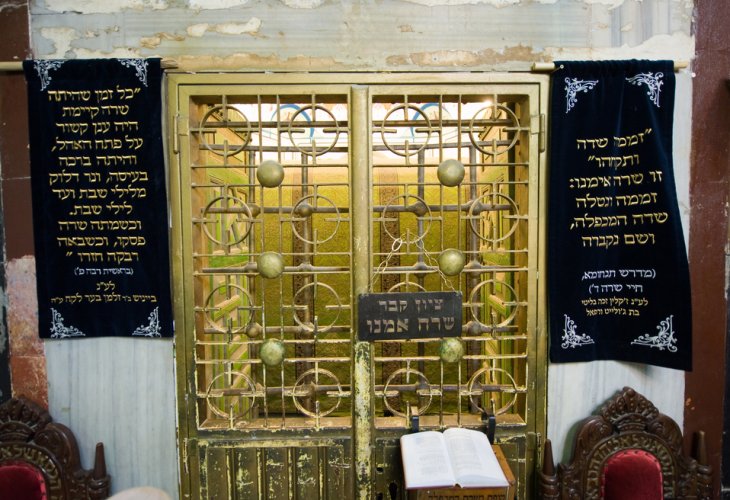Torah Personalities
Sarah: Prophetess, Matriarch, and Woman of Valor
From spiritual leadership to personal sacrifice, the life of Sarah shaped the soul of the Jewish people and continues to inspire generations
 (Photo: shutterstock)
(Photo: shutterstock)Sarah, wife of Avraham, is one of the foundational figures in Jewish history. More than just the first matriarch, she was a prophetess, a teacher, and a paragon of faith, modesty, and strength. Her story was marked by trials, miracles, and profound spiritual influence, and it offers a rich portrait of a woman whose legacy continues to echo through every Jewish home.
Names, Prophecy, and Spiritual Greatness
Sarah is first referred to in the Torah as Yiskah, a name associated with her prophetic vision. The Sages explain that she was called Yiskah because she “saw” (sakhah) with ruach hakodesh (Divine inspiration), and because all would gaze upon her beauty, both physical and spiritual. Rashi adds that the name Yiskah also alludes to nesichut (nobility), just as “Sarah” connotes leadership and sovereignty.
Originally named Sarai, she was barren and born without a womb. Hashem changed her name to Sarah and blessed her to conceive: “Sarai your wife, you shall not call her Sarai, for Sarah is her name. I will bless her, and she will bear you a son… Kings of peoples will rise from her” (Bereishit 17:15–16). She gave birth to Yitzchak at age 90.
The Midrash teaches that the Hebrew letter yud removed from Sarai’s name was given later to Yehoshua (originally Hoshea).
Sarah’s prophetic level was unmatched. The Talmud (Sotah 29a) says that Sarah was the only woman whom Hashem ever spoke with directly. Rashi explains that even when Avraham listened to her advice—such as taking Hagar as a second wife—it was because her words were Divinely inspired. Hashem told Avraham: “Whatever Sarah tells you, listen to her voice” (Bereishit 21:12), indicating her superior level of prophecy.
Teaching, Trials, and Miracles
Together with Avraham, Sarah spread belief in one God throughout the ancient world. The Midrash explains that while Avraham reached out to men, Sarah taught the women. The “souls they made in Charan” (Bereishit 12:5) were converts who accepted their message. According to the Zohar, Sarah influenced not only minds but also their souls, awakening Divine sparks even in those far from Torah.
Sarah endured many trials with extraordinary faith. When famine struck Canaan, she and Avraham traveled to Egypt. Fearing he would be killed for her beauty, Avraham asked Sarah to say she was his sister. Though she was hidden in a box at the border, the Egyptians discovered her and brought her to Pharaoh’s palace. There, she prayed: “Master of the world, Avraham entered Egypt with a Divine promise. I entered with only faith.” All night, an angel stood ready to strike Pharaoh at Sarah’s command. Pharaoh was afflicted with plagues and released her untouched, rebuking Avraham for hiding the truth.
A similar episode took place later in Gerar. Again, Avraham asked Sarah to present herself as his sister to protect his life. King Avimelech took her into his palace, but Hashem appeared to him in a dream, warning him that Sarah was a married woman. Avimelech returned Sarah and challenged Avraham for misleading him. In both trials, Sarah’s integrity, modesty, and trust in Hashem protected her and sanctified His Name.
Three ongoing miracles accompanied Sarah in her tent:
A cloud of glory hovered above it.
Her Shabbat candles remained lit from week to week.
Her dough was blessed with Divine abundance.
These signs of holiness ceased at her passing and returned only when Yitzchak married Rivkah and brought her into Sarah’s tent.
The Midrash describes Sarah’s exceptional modesty. When angels visited Avraham, they asked, “Where is Sarah your wife?”—not because they didn’t know, but to highlight her humility in remaining in the tent.
Sarah's Enduring Legacy
Sarah was 127 when she passed away. According to the Midrash, the Satan told her that Yitzchak had been sacrificed, and she died from the shock. Avraham purchased the Cave of Machpelah in Chevron to bury her.
The verse “And the life of Sarah was 127 years…” (Bereishit 23:1) is expounded by the Sages: At 100, she was as free from sin as at 20; at 20, she was as beautiful as at 7.
Sarah conceived Yitzchak on Rosh Hashanah. According to the Midrash, in Sarah's merit, many people experienced medical miracles on that day: infertile women conceived, the deaf heard, the blind saw, and the mentally unstable were healed.
Sarah is identified in the Midrash as the subject of Eishet Chayil (“A Woman of Valor”), as exemplified by the following verses (among others):
“A woman of valor, who can find?”—Avraham eulogized Sarah with these words.
“Her husband trusts in her…”—when Avraham asked her to pose as his sister.
“She rises while it is still night…”—reflected in Avraham’s early rising to fulfill Hashem’s command.
“She considers a field and buys it…”—the Cave of Machpelah, which she was buried in.
“She opens her mouth with wisdom…”—when she advised Avraham to take Hagar.
Every verse in that song of praise, the Sages say, reflects Sarah’s life and greatness.
Sarah Imeinu was not only the first matriarch of the Jewish people; she was their spiritual foundation. From her prophetic voice to her spiritual work to her motherly strength, Sarah remains a timeless example of what it means to live with purpose, holiness, and grace.

